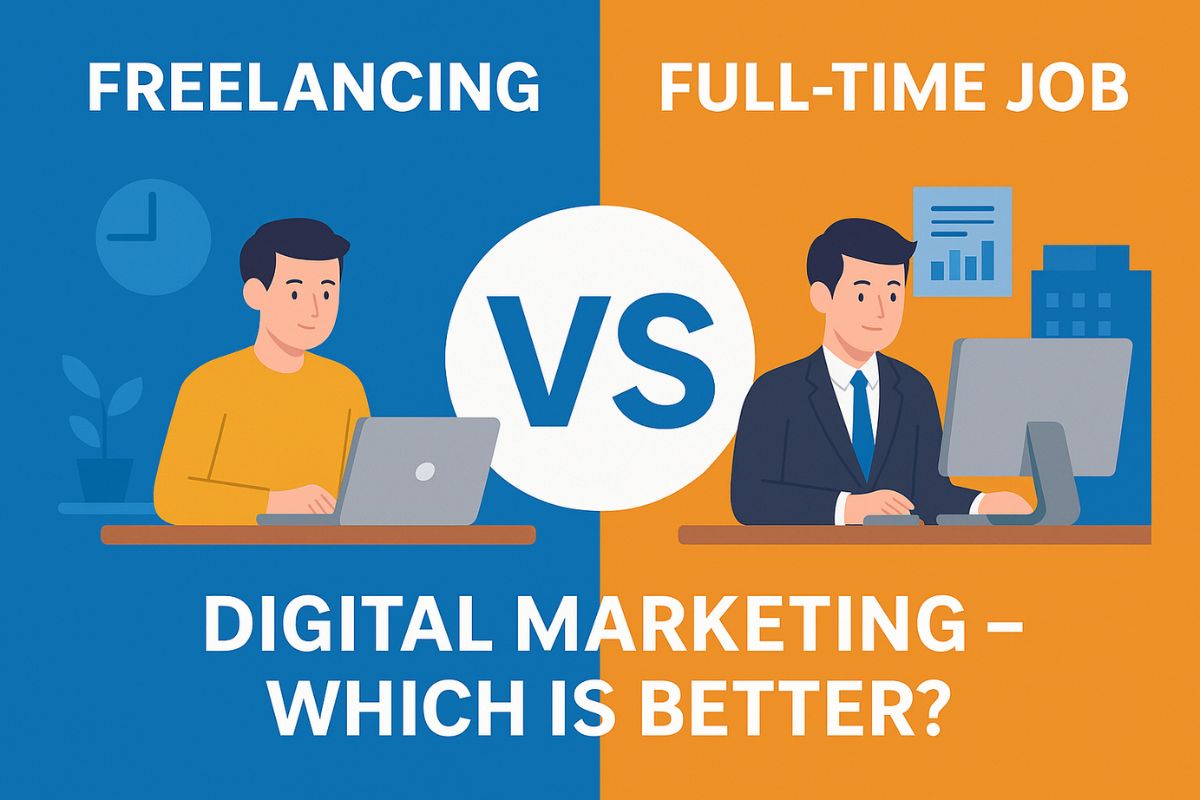How to Manage Client Payments a Freelancer in the Digital Marketing Industry in India?

In India, freelancing has emerged as a preferred career path for many professionals. The freedom to choose projects, set your hours, and work from any location makes freelancing an attractive option. However, one of the most challenging aspects of freelancing, particularly in the digital marketing industry, is managing client payments.
Ensuring timely and accurate payments can be the difference between a successful freelance career and a stressful one. This article delves into the current trends in the digital marketing industry, explores why people choose freelancing and provides comprehensive strategies for managing client payments effectively.
Current Trends in the Digital Marketing Industry
The digital marketing industry in India is booming, driven by the rapid adoption of digital platforms and the growing importance of online presence for businesses. Here are some key trends shaping the industry:
- Increased Demand for Digital Marketing Services: With more businesses shifting their focus online, the demand for digital marketing services such as SEO, content marketing, and social media management has skyrocketed. This has led to a surge in opportunities for freelancers.
- Remote Work and Global Opportunities: The pandemic has normalised remote work, allowing Indian freelancers to collaborate with clients from around the world. This has opened up a global market for digital marketing professionals.
- Shift Towards Specialised Skills: Clients are increasingly looking for freelancers with specialised skills, such as PPC advertising, data analytics, and influencer marketing. This trend has created niches within the freelancing market, where experts in specific areas can command higher rates.
- Rise of Gig Platforms: Platforms like Upwork, Freelancer, and Fiverr have made it easier for freelancers to find clients. However, competition on these platforms is fierce, and freelancers often need to offer competitive pricing to win projects.
- Emphasis on ROI: Clients are more focused on the return on investment (ROI) from their digital marketing efforts. Freelancers who can demonstrate a clear link between their work and measurable business outcomes are in high demand.
Why People Choose Freelancing?
Freelancing, particularly in the digital marketing industry, has become a popular career choice for several reasons:
- Flexibility and Independence: Freelancers have the freedom to choose when and where they work. This flexibility allows for a better work-life balance, which is a significant draw for many professionals.
- Diverse Work Opportunities: Freelancing allows individuals to work on a variety of projects across different industries. This diversity keeps the work interesting and helps freelancers build a broad skill set.
- Higher Earning Potential: Skilled freelancers can often earn more than their counterparts in full-time jobs, especially if they specialise in high-demand areas like SEO, PPC, or social media management.
- Creative Freedom: Freelancers often have more creative control over their projects compared to those working in traditional jobs. This creative freedom is particularly appealing to digital marketing professionals.
- Growing Entrepreneurial Spirit: Many people are drawn to freelancing because it allows them to run their own business. They can build their brand, set their prices, and grow their client base, which can be highly rewarding.
How to Manage Client Payments?
Managing client payments is one of the most important aspects of freelancing. It ensures a steady cash flow, which is vital for sustaining a freelance business. Here are some strategies for effectively managing client payments in the digital marketing industry:
1. Setting Clear Payment Terms
The first step in managing client payments is setting clear payment terms. This includes:
- Payment Schedule: Decide whether you want to be paid upfront, on a milestone basis, or after project completion. Clearly communicate this to your clients.
- Late Payment Penalties: Include penalties for late payments in your contract. This can be a percentage of the invoice amount added for each day the payment is late.
- Payment Methods: Specify the payment methods you accept, such as bank transfers, PayPal, or UPI. Ensure these methods are convenient for both you and your clients.
2. Using Contracts
Always use a contract when taking on a new client. The contract should outline the scope of work, payment terms, deadlines, and any other important details. A well-drafted contract protects both you and the client and provides a clear reference point if any payment issues arise.
3. Invoicing Promptly and Accurately
Timely invoicing is essential for getting paid on time. Here’s how to manage your invoicing process:
- Send Invoices Promptly: As soon as you complete a milestone or project, send your invoice. Delays in invoicing can lead to delays in payment.
- Itemise Services: Clearly itemise the services provided and their corresponding costs. This helps avoid any confusion and disputes.
- Include Payment Details: Ensure your invoice includes all the necessary payment details, such as your bank account information or PayPal address.
4. Tracking Payments
Keep a detailed record of all your invoices and payments. Use accounting software or a simple spreadsheet to track which invoices have been paid and which are still outstanding. Regularly review this data to follow up on overdue payments promptly.
5. Managing Late Payments
Despite your best efforts, late payments can still occur. Here’s how to handle them:
- Follow Up: Send a polite reminder as soon as a payment is overdue. If the client still doesn’t pay, follow up with additional reminders.
- Charge Late Fees: If you have included late payment penalties in your contract, remind the client of these fees when following up on late payments.
- Negotiate: If a client is facing genuine financial difficulties, consider negotiating a payment plan. However, ensure this is documented in writing.
- Legal Action: As a last resort, you can consider taking legal action to recover unpaid fees. However, this can be costly and time-consuming, so it’s best to exhaust all other options first.
6. Using Payment Platforms
Payment platforms can help streamline the payment process. Here’s how they can benefit you:
- Automation: Many platforms offer automated invoicing and payment reminders, reducing the time you spend on administrative tasks.
- Security: Payment platforms often have built-in security features, protecting you from fraud and ensuring that payments are processed safely.
- Global Payments: If you work with international clients, platforms like PayPal or TransferWise can make it easier to receive payments in different currencies.
7. Building Strong Client Relationships
Good client relationships can lead to timely payments and repeat business. Here’s how to build and maintain these relationships:
- Communication: Keep your clients informed about the progress of their projects. Clear communication helps build trust and ensures that clients are more likely to pay on time.
- Deliver Quality Work: Consistently delivering high-quality work increases your value in the eyes of your clients, making them more willing to pay promptly.
- Be Professional: Maintain a professional demeanor in all your interactions. This includes being punctual, meeting deadlines, and responding to client queries promptly.
8. Managing Cash Flow
Effective cash flow management is crucial for sustaining your freelance business. Here’s how to manage your cash flow:
- Budgeting: Create a budget that accounts for your regular expenses and income. This will help you plan for periods when payments are delayed.
- Emergency Fund: Set aside an emergency fund to cover your expenses during times when payments are delayed or when business is slow.
- Invoice Financing: If you’re facing a cash flow crunch, consider invoice financing. This allows you to borrow against your unpaid invoices to get the cash you need.
Final Thoughts
Freelancing in the digital marketing industry in India offers numerous opportunities for growth and financial independence. However, managing client payments effectively is crucial for long-term success. By setting clear payment terms, using contracts, invoicing promptly, tracking payments, managing late payments, using payment platforms, building strong client relationships, and managing cash flow, freelancers can ensure they get paid on time and maintain a steady income. With the right strategies in place, you can focus on what you do best—delivering top-notch digital marketing services to your clients.
To streamline your payment process and ensure you never miss a payment, sign up for Razorpay and automate your payments today. Razorpay offers a secure and efficient way to manage client transactions, helping you focus on growing your freelance business without worrying about delayed payments.
Calling all Marketers!
🔴 Are you tired of searching for the perfect job?
Whether you're into content writing, SEO, social media, graphic design, or video editing—full-time, freelance, remote, or onsite—we've got your back!
👉 We post over 30 job opportunities every single day. Yes, every day (all verified).
Join the most reliable and fastest-growing community out there! ❤️
And guess what? It’s FREE 🤑
✅ Join our WhatsApp Group (Click Here) and Telegram Channel (Click Here) today for instant updates.







